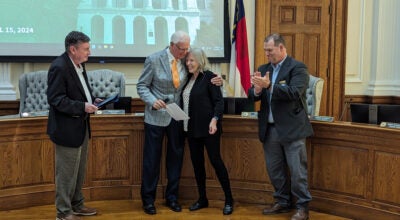In death comes the gift of life
Published 12:00 am Tuesday, December 24, 2013
On Nov. 10, 2012, Eric Lentz suffered a massive brain bleed, the result of a ruptured aneurysm. He died two months later. But in the midst of this painful time, he gave a gift to his two children — a gift of knowledge that could save them from the same fate.
In early October 2012, Jonathan and Meredith Williams found out they were expecting their second child. They were anxious to share the news with their family, including Meredith’s parents, Eric and Kimberly. But first they went to OctoberTour together, and then they went out to eat together, and even then they still had to wait.
“When you were with Daddy, there were always people stopping to talk,” Meredith explains. Eric was one of those people who never met a stranger — and if he did, he’d introduce himself.
“When we were getting in the car to leave, we told them, and Daddy just gave me a great big hug,” Meredith remembers.
A month later, tragedy struck.
g g g
The afternoon of Nov. 10 was a busy one for the family. The Lentz house was on the Spencer Christmas tour, so everyone helped put up decorations. Jonathan and Meredith had just gotten home and put son Ashton to bed when Kimberly called. She was going to take Eric to the emergency room. He was throwing up and complaining of a severe headache. Eric was a big man, and his wife couldn’t manage him alone.
At the hospital, Eric was having trouble with the questions the staff was asking him. He couldn’t remember his Social Security number. He gave his name as “Calvin Eugene,” ��� the family knows no one by that name — but he gave his birthdate correctly.
Jonathan saw the nurses exchange glances. They were all thinking Eric might have had a stroke. But a CT scan revealed Eric had a massive brain bleed. Hospital personnel told the family Eric needed to be airlifted to a trauma center. The family chose Wake Forest Baptist Medical Center because it was close to home in Spencer, where most of them live.
“These guys came in wearing their flight suits, and they looked like space cowboys,” Jonathan says. “They were there to save the day. Air Care flies right over our house, so we’re constantly reminded of it.”
“It’s a reminder to pray,” Meredith says.
g g g
Throughout the visit to the emergency room and the trip over to Baptist, Jonathan stayed calm. “But I didn’t have a good feeling about it. I’m not an optimist.”
“Because my dad’s dad had a pretty similar experience, my parents had already had conversations to decide how things needed to be handled,” Meredith says.
Jonathan, 31, and Meredith, 30, had even discussed the possibility that her father may one day have an aneurysm. But Meredith’s grandfather was 72 when his occurred. Eric was only 62.
“I always had a fear that Eric would have a stroke,” Kimberly says. “But I never thought it would be at 62.”
g g g
Nicholas, 26, drove late into the night to arrive at Baptist from Richlands, near Jacksonville. If there were state troopers on the road that night, he didn’t see them. He called en route, and they held the phone to Eric’s ear.
“I told him I loved him,” Nicholas says. “What else could I say?”
A shunt was inserted to relieve pressure on Eric’s brain. If he responded, the neurosurgeon would do surgery early the next morning.
“We thought he was young enough to handle the surgery,” Meredith says. “It was a matter of life and death, and we felt we were making a decision of life.”
Looking back, they know now they didn’t consider what kind of quality of life their father might have.
“He definitely had high standards for quality of life,” Meredith says. “He saw that life not high in quality would be worse than death.”
But at that moment, she says, “we were dealing with hopeful people.”
They were hopeful, too.
g g g
Over the next eight weeks, Eric was responsive only intermittently. He did not make good progress, facing one setback after another.
“Even the doctors had different opinions,” Meredith says. “You kind of rely on these people a lot, so it’s confusing when they give you different opinions.”
After Eric’s first surgery, the neurosurgeon, Dr. Rashid Janjua, had asked Kimberly a curious question. How many children did they have?
He wanted them to be tested immediately for aneurysms.
“I thought, why would we want to know?” Kimberly says. “What good is it to know you’re living with a time bomb?”
g g g
Aneurysms are most often caused by environmental factors such as smoking, obesity and hypertension. But Dr. Janjua knew Eric’s family history.
“If one direct family member has an aneurysm, it sparks an investigation,” says Janjua, assistant professor of neurosurgery and director of cerebrovascular surgery at Wake Forest Baptist Medical Center. Aneurysms are not hereditary, he says. “It’s more nuanced than that. When you’re talking about aneurysms, you’re talking about susceptibility.”
And with two direct family members who’d had aneurysms, Eric’s children were susceptible.
Meredith’s tests would have to wait since she was pregnant. Nicholas, too, decided to wait.
“I wasn’t really thinking about myself,” he says. “I’d just rather not know. But I did get the test. I probably would have continued to wait, though.”
“We all figured Nicholas would be the most at risk, since the aneurysms had occurred in the males in our family,” Meredith says.
Janjua notes, “It is good to investigate it sooner rather than later.”
In July, Meredith asked her primary care physician to refer her for an MRA, which is a type of MRI. Their second son, Jackson, had been born in April. Nicholas finally relented and had the same test done.
“It was easy,” he says, and despite the fact that he’s 6 foot, 6 inches tall and weighs 250 pounds, he fit easily in the tube.
His results were fine.
Meredith picked up the results of her test and opened the report in the parking lot of her doctor’s office.
“It said I had a very small aneurysm in the same place Daddy’s was,” Meredith says. Her two babies were in the back of her car.
She did not immediately call her mother.
g g g
Meredith sent her results to Janjua, and set up an appointment with him at Baptist. He pulled up her scans, the same way he had pulled up her father’s.
“He said it definitely looked like an aneurysm, but it could just be a vein,” Meredith says.
Janjua ordered a CT angiogram, which Meredith had done in November. He inserted a catheter through her groin, up to her brain, and injected dye. Afterward he told her there was absolutely no aneurysm. It was just a vein.
“But I was scared for a long time,” Meredith says.
Janjua recommended that Meredith and Nicholas continue to have scans every 10 years.
“It’s the amount of time it takes to save up the money for it,” Nicholas says, grinning a grin not unlike his daddy’s.
It’s actually because aneurysms grow so slowly, Janjua says.
g g g
Nicholas and Meredith have gone on with their lives.
“I’m not too into worrying about things I can’t control,” Nicholas says.
The siblings are trying to stay in good physical shape, Jonathan says. “We feel better having had the two scans. It gives us a good comfort level for the next 10 years.”
If anything ever does happen, Meredith says, she feels that the technology available will ensure a good outcome. If an aneurysm did show up, it could be fixed by what’s called a coil procedure. Again going through the groin, Janjua would seal the aneurysm, and Meredith would go home with a Band-aid on her leg.
Jonathan and Meredith will have their sons tested at some point.
“We’ll stick with Dr. Janjua,” Meredith says. “Whatever he tells us to do, we’ll do.”
“There is no reason to lead anything but a normal life,” Janjua says. “It is not like they are walking on eggshells.”
Nicholas feels the susceptibility is something similar to high blood pressure, which he also has, and for which he’s taken medication since high school.
“I told the doctor, some engines just run hot,” Nicholas says, looking and sounding for all the world just like his daddy.
g g g
Nicholas doesn’t think about his medical history much, he admits. “I block it out. But I think about my daddy every day. Like, the other day, I was working on lights in Mom’s kitchen. Any normal person would have just laid the board up there. But he had spliced wires and put screws in. He way overbuilt it.”
Nicholas wasn’t surprised.
One weekend last month, Jonathan was helping his mother-in-law put up Christmas decorations.
“It just made me miss him so much,” he says of Eric. “I thought, I’d really like for him to be here and have him aggravate the crap out of me. There’s not a place you go in Spencer that you don’t see something Eric has touched. He did a lot of good things for the community.”
He adds, “There was a lot of stuff around the house that Eric didn’t get done. We’re still finding Post-it notes.”
If Eric had an idea, he’d jot it down on a Post-it note. The last time Jonathan borrowed Eric’s truck, out fluttered a Post-it note with an idea for a Meals on Wheels bumper sticker: These Wheels Deliver Meals.
“He had a little bit of a hoarding situation,” Nicholas admits. For example, he bought not just one but many sprinklers, because he was looking for the best one, his son says. And when he found it, he bought several, for parts, because they were no longer being manufactured.
“They’re pretty darn good sprinklers,” Jonathan notes.
Meredith, too, thinks about Eric every day, especially at school, when she has to meet new people. She is an assistant principal at North Rowan Middle School.
“I think, gosh this is something Daddy would love,” Meredith says. “I’m more introverted, so I try to act like my dad.”
That goes for beautification projects around campus, too, she says. “I feel this compulsion, and I know it’s Eric.”
At the mention of his granddaddy’s name, baby Jack squeals in delight.
Freelance writer Susan Shinn lives in Salisbury.




